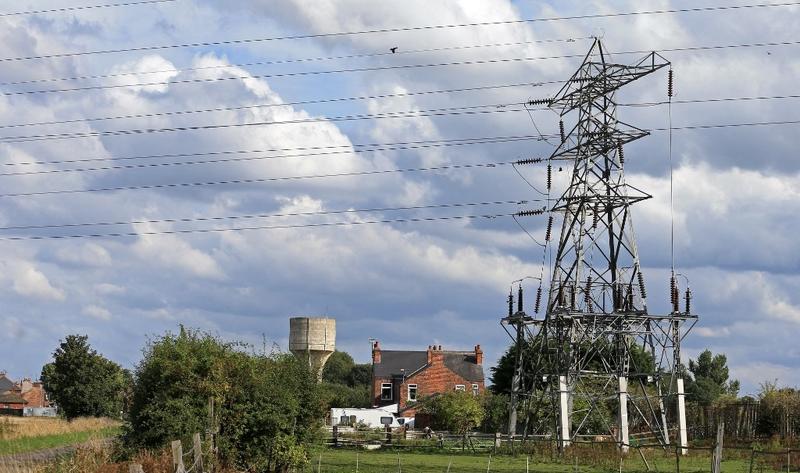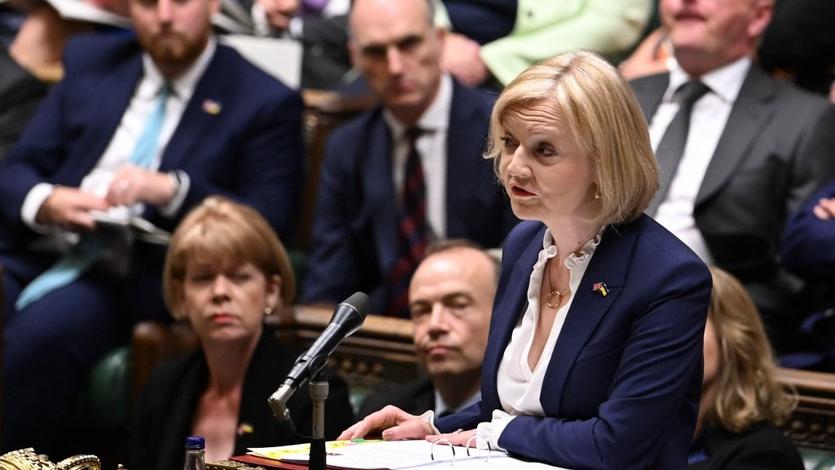 Electricity pylons hold power cables leading away from the SSE (Scottish and Southern Energy) gas-fired Keadby Power Station near Scunthorpe in northern England on Sept 6, 2022. (LINDSEY PARNABY / AFP)
Electricity pylons hold power cables leading away from the SSE (Scottish and Southern Energy) gas-fired Keadby Power Station near Scunthorpe in northern England on Sept 6, 2022. (LINDSEY PARNABY / AFP)
LONDON - New British Prime Minister Liz Truss will cap soaring consumer power bills on Thursday and promote new sources of energy in an expected 100 billion pound (US$115 billion)-plus package designed to limit the economic shock caused by the conflict in Ukraine.
The government is expected to set out new sources of energy supply including the issuance of up to 130 oil and gas exploration licences in the North Sea and a scrapping of a ban on fracking if local communities agree
With Britain facing a lengthy recession sparked by a near quadrupling of household energy bills, Truss - appointed prime minister on Tuesday- has said she will take immediate action to protect consumers.
A jump in government borrowing to fund the support package plus a pledge by Truss to cut taxes has rattled financial markets. On Wednesday the pound fell against the dollar to levels last hit in 1985.
Truss is expected to set out her plan to lawmakers at around 1000 GMT.
Deutsche Bank said the energy price offset and the promised tax cuts could cost 179 billion pounds, or about half of the amount Britain spent on the COVID-19 pandemic.
ALSO READ: UK inflation hits 40-year record, highest in G7
The government is also expected to set out new sources of energy supply including the issuance of up to 130 oil and gas exploration licences in the North Sea and a scrapping of a ban on fracking if local communities agree.
 This handout photograph released by the UK Parliament shows Britain's Prime Minister Liz Truss speaking during her first weekly Prime Minister's Questions session at the House of Commons, in London, on Sept 7, 2022. (JESSICA TAYLOR / UK PARLIAMENT / AFP)
This handout photograph released by the UK Parliament shows Britain's Prime Minister Liz Truss speaking during her first weekly Prime Minister's Questions session at the House of Commons, in London, on Sept 7, 2022. (JESSICA TAYLOR / UK PARLIAMENT / AFP)
Prime Minister Liz Truss' plan is expected to cool inflation - which at 10.1 percent is already the highest of any leading economy - but it will add more than 100 billion pounds to Britain's borrowing, putting more strain on public finances with the energy crisis possibly lasting into next winter
"We will take action immediately to help people and businesses with bills but also ...to tackle the root cause of these problems, so that we are not in this position again," Truss said in a statement.
"We will set out our plans to deliver on that promise and build a prosperous Britain for everyone."
Daunting challenges
With industrial unrest also spreading, Truss faces one of the most daunting sets of challenges for an incoming leader in Britain's post-war history.
Her plan is expected to cool inflation - which at 10.1 percent is already the highest of any leading economy - but it will add more than 100 billion pounds to Britain's borrowing, putting more strain on public finances with the energy crisis possibly lasting into next winter.
ALSO READ: UK inflation surges to highest in a decade on energy costs
It also marks a major turnaround from her rejection of "handouts" during the early stages of the Conservative Party leadership campaign.
Charities had warned that millions of households face destitution this winter if the cap on average energy prices were allowed to jump 80 percent in October and again in winter.
 Amended prices are seen on a self-service laundromat in Manchester, England, Sept 7, 2022. (JON SUPER / AP)
Amended prices are seen on a self-service laundromat in Manchester, England, Sept 7, 2022. (JON SUPER / AP)
Truss is also expected to lift a ban on fracking, which involves extracting shale gas from rocks by breaking them up with water and chemicals at high pressure. It was banned in 2019 after the oil and gas authority said it was not possible to predict the magnitude of earthquakes it might trigger
Companies are also at risk. Many have received new energy bills that they say threaten to put them out of business.
According to two sources familiar with the government's discussions, Truss will announce dozens of new North Sea exploration licences in a bid to boost domestic production.
She is also expected to lift a ban on fracking, which involves extracting shale gas from rocks by breaking them up with water and chemicals at high pressure. It was banned in 2019 after the oil and gas authority said it was not possible to predict the magnitude of earthquakes it might trigger.
Neither of the proposals will provide any short-term relief however as it typically takes between five to 10 years from initial exploration until oil and gas is produced from a field. Fracking projects will require a lengthy planning process.
READ MORE: Liz Truss' cabinet is Britain's first without white man in top jobs
"If we want energy sufficiency, we have to look at every source including clearly new nuclear or more renewables," the minister for levelling up, Simon Clarke, told Sky News. "We also ought to look at technologies like fracking... There is a balanced approach to this question."


